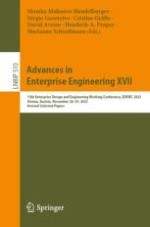2024 | Buch
Advances in Enterprise Engineering XVII
13th Enterprise Design and Engineering Working Conference, EDEWC 2023, Vienna, Austria, November 28–29, 2023, Revised Selected Papers
herausgegeben von: Monika Malinova Mandelburger, Sérgio Guerreiro, Cristine Griffo, David Aveiro, Henderik A. Proper, Marianne Schnellmann
Verlag: Springer Nature Switzerland
Buchreihe : Lecture Notes in Business Information Processing
